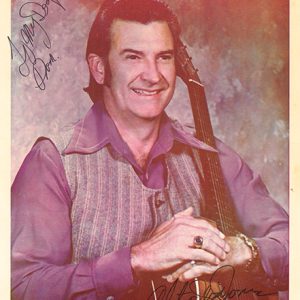calsfoundation@cals.org
Arkansas Waltz
In 1917, the Arkansas General Assembly designated “Arkansas,” a patriotic anthem composed by Eva Ware Barnett, as the state’s first official song. It remained as such until the late 1940s, when a copyright dispute led to the state’s adoption of “The Arkansas Traveler” as the state’s musical symbol. In 1963, the dispute was settled amicably, and “Arkansas” resumed its former place as the state song—a title it would hold until the late 1980s. “Arkansas” was not, however, without its challengers during this second tenure. One challenger managed to garner a degree of legislative recognition: in 1971, the Arkansas State Senate voted to designate “Arkansas Waltz” by Bill Urfer of Heber Springs (Cleburne County) and Cletus “Slim” Jones of Benton (Saline County) as the official state waltz. This move occasioned a minor flare-up of posturing between the legislative chambers from which, ultimately, both sides backed down.
Slim Jones was born in Lonsdale (Garland County) in 1924 and raised on Ten-Mile Creek near Glen Rose (Hot Spring County). He began playing guitar in his teens and performed with Vernon Wallis on local radio before World War II. He served in the U.S. Army during the war and then returned to Arkansas. In 1970, Jones teamed with Heber Springs songwriter and musician Bill Urfer to compose “Arkansas Waltz,” a sentimental reverie in which the narrator and a partner dance beneath an Ozark moon. The narrator’s attention, however, is less on his dance partner than on the state he loves:
Blossoms of white on apple trees,
Mockin’ birds singing, just for me,
The air is clean, for me to breathe
In Arkansas.
The lyrics and recitative passages extol Arkansas’s scenery, its agriculture, and even the athletic prowess of its flagship college teams:
Your teams win almost every game
Those Hogs and Indians are hard to tame
When you hear the call, they’ve got the ball
That’s Arkansas.
The song was released as a 45 rpm single in 1970 on Lawson Records, a label owned by Urfer. Its dust jacket listed Cletus “Slim” Jones as the vocalist, plus “Bill Urfer and his piano,” accompanied by Gene Gasaway (fiddle), Zyndall Raney (piano), Eddie Slusser (guitar), Danny Turney (bass), and Bobby Boles (drums). Zyndall Raney was the son of performer/producer Wayne Raney and a performer in his own right. The recording session took place at Wayne Raney’s studio in Concord (Cleburne County), and the record was pressed by the Raneys’ Rimrock Records plant, also located in Concord. Slusser was a regionally esteemed rockabilly guitarist, while Gasaway was a veteran of tours with Bob Wills and His Texas Playboys. The jacket art consisted of a humorous photograph showing a lakeside campsite being inspected by curious black bears while the agitated camper watches, helpless, from his fishing boat offshore.
According to Jones, Urfer promoted the song’s official designation. He caught the attention of state Senator Virgil T. Fletcher, who enlisted Senator Clarence Bell as co-sponsor of Senate Concurrent Resolution 5. The measure was introduced on January 18, 1971, approved on January 26, and duly passed along to the House of Representatives for the necessary concurrence. There, however, it met reluctance: the House rejected the measure on February 9, with one opponent complaining that the lyrics looked backward rather than toward the future, and that the song mentioned having to leave the state in order to find work. It was rejected again on February 15. Undiscouraged, Urfer and Jones revised the lyrics to remove anything the legislators found objectionable. A February 23 Arkansas Gazette story reported that the duo was preparing to record a new version.
The next day, Urfer and Jones brought their amended version to the Senate for a hearing. The Gazette noted that Urfer and Jones had “conducted one of the most persistent lobbying efforts of the session” and described the pair playing the revised version first in the Senate quiet room, then in the hallways outside the chamber, and finally in the main chamber. The Senate once more gave its assent to Urfer’s song, producing what was now called Senate Concurrent Resolution 15, with hopes for House agreement running high.
On February 25, however, the House was serenaded by Luke Jeter of Washington County, a fiddling champion and songwriter, who brought with him not only his instrument but also a recording of his own composition, also called “Arkansas Waltz.” The song was performed on the recording by the Uarkettes, a choral group from the Fayetteville (Washington County) campus of the University of Arkansas (UA). The song impressed several legislators, enough so that the Washington County delegation introduced House Concurrent Resolution 44, proclaiming Jeter’s “Arkansas Waltz” the official state waltz.
A March 9 article in the Gazette asserted that the “Battle of the Waltzes Goes On; Score Is Hazy.” The previous day, the House had rejected SCR 15, although it had not yet voted on its own HCR 44. The paper quoted legislators who were unsure of the need to select one or the other; Representative Ron Archer of Russellville (Pope County) suggested, “Let’s stay out of the waltz business for a while.” The article also noted that Cletus Jones had been outside the House chamber while the vote was taken: “He stuck his head in the door to hear the vote and looked glum when the ‘nos’ obviously outweighed the ‘ayes.’”
Jones and Urfer, however, still had friends in the capitol. On March 8, a resolution (SR 24) was introduced by Senators Fletcher and Bell, now joined by Harold King. The text noted that while neighboring states had already designated official waltzes, Arkansas had not yet done so, adding that “Arkansas Waltz” clearly described the state’s transformation into a place where young people no longer needed to leave in order to find employment; it was thus a fitting and proper candidate for official designation as the state waltz.
On March 10, the resolution met with no objections and was adopted. It was not drafted as a joint or concurrent resolution, however, and so was not sent to the House for approval. On March 11, Rep. George Nowotny of Fort Smith (Sebastian County) introduced a resolution (HR 62) claiming that unilateral action by the Senate did not constitute sufficient designation of a state song. A week later, the House rejected HR 62, with some House members arguing that its passage might anger senators and impede the smooth flow of legislating. On March 25, Nowotny’s resolution was given one last vote in the House, passing on voice vote but failing after a roll call vote was requested.
“Arkansas Waltz” technically failed to attain designation as an official state symbol. This did not, however, discourage Urfer and Jones from renaming the tune “The Official Arkansas Waltz,” publishing a piano arrangement, and releasing a new recorded version, both as a single and as part of a full-length album of twelve songs. The album carried a color photograph of Jones standing with his guitar in front of the Arkansas State Capitol.
“The Official Arkansas Waltz” never became the song sung in schools across the state that Urfer dreamed of, but it remained in circulation. Cletus Jones performed it regularly, and at some point, the Official Arkansas Waltz Album was released with a new cover promoting the Diamondhead (Hot Spring County) resort community. For this, Jones posed in front of a white Cadillac De Ville bearing the Diamondhead logo and, on its rear flank, a representation of a flag bearing the proud legend “Cletus Jones Recording Artist.”
For additional information:
Arkansas Secretary of State Collections. Arkansas State Capitol, Little Rock, Arkansas.
Barger, Carl. Cleburne County and Its People. Vol. 2. Bloomington, IN: AuthorHouse, 2008.
“Battle of the Waltzes Goes on: Score is Hazy.” Arkansas Gazette, March 9, 1971, p. 11A.
“House Rejects Move to Slap Senate Waltz.” Arkansas Gazette, March 18, 1971, p. 13A.
Koch, Stephen. “Jones’ ‘Arkansas Waltz.’” Arkansas Times, May 12, 2005, p. 44. Online at http://www.arktimes.com/arkansas/jones-arkansas-waltz/Content?oid=866293 (accessed November 6, 2020).
“Resolution to Designate Official State Waltz is Defeated in the House.” Arkansas Gazette. February 10, 1971, p. 16A.
“Urfer Alters His Waltz, Seeks Replay.” Arkansas Gazette, February 23, 1971, p. 4A
‘Waltz’ Resolution in House Passes Voice Vote, But Not One for Record.” Arkansas Gazette, March 26, 1971, p. 9A.
David Ware
Arkansas Secretary of State’s Office
 Divergent Prosperity and the Arc of Reform, 1968–2022
Divergent Prosperity and the Arc of Reform, 1968–2022 Music and Musicians
Music and Musicians Politics and Government
Politics and Government Cletus Jones
Cletus Jones 




Comments
No comments on this entry yet.